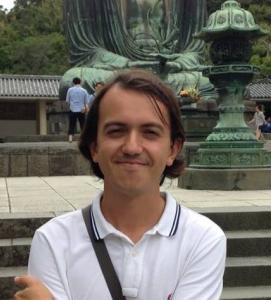Paride Stortini

I am honored and thrilled at becoming a Martin Marty Fellow in the academic year 2019-2020. I am looking forward to sharing my research there, learn from my peers, and being challenged to present those aspects of my research that make it valuable for a broader public, which is, in my opinion, an essential task that scholarship on religion today must be able to accomplish. In the past years of my PhD path, I could particularly appreciate the Divinity School as a place where students committed to the study of religion investigate it from a variety of perspectives, approaches, and area expertise. I expect this already invaluable conversation to be further enriched by the Martin Marty Center’s concern with the public understanding of religion, which will challenge me and the other fellows to develop our research while asking how it benefits a broader audience.
My dissertation research focuses on how Japanese Buddhist priests and scholars in late nineteenth and early twentieth centuries developed new forms of knowledge about the Indian origins of Buddhism through contact with Western scholarship and direct travel to South Asia, and how they used this knowledge to redefine a place for Buddhism in modern Japan, responding to threats of persecution and demise of it. Using post-colonial theory, I trace the very moment in which Japanese Buddhists encountered, appropriated, and redeployed the orientalist knowledge and imagination of India that was at the basis of modern Buddhist studies and of the comparative study of religion in Europe. In the same period, those Japanese Buddhists could also visit for the first time India, the cradle of Buddhism, a land they only imagined before through Chinese pilgrims’ travelogue, literary accounts and Buddhist cosmology. These experiences and forms of knowledge were key in establishing an approach to Buddhism that could be deemed scientific and modern, while stressing Buddhist contribution to the rising nation-state of Japan.
While I develop this topic within the fields of Buddhist studies and the intellectual history of religion, the questions that are leading my research are of broader interest. For example, my analysis of the establishment of modern scholarly approaches to religion between Europe and Asia requires to engage with issues of secularization and the modern nation-state, the role of religion in education, and contested definitions of scientific approaches to religion. In addition, I trace how these ideas and images about India reached the Japanese public through media such as newspapers and art exhibitions, and how the same broader audience responded to them. As reflecting on the role of the scholar of religion in the public sphere is central in my dissertation research, I share the core concern of the Martin Marty Center for the public understanding of religion.
During the 2019-2020 academic year in which I will be a fellow at the Center, I plan to write two-to-three chapters of my dissertation, and submit the second or third for discussion with my peers at the Martin Marty Center. I am sure that their varied expertise, methodological and theoretical approaches to religion will provide invaluable feedback to my research, and I aim at contributing to the lively debate on religion and the public sphere whose promotion is the Center’s mission.

